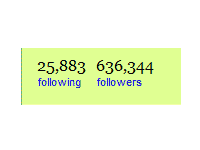
Most People on Twitter Don’t Tweet
7 June 2009, Jonathan Saipe
 In this world there are few evangelists out there. Most of us conform to the pack mentality and will be happy to follow than to lead.
In this world there are few evangelists out there. Most of us conform to the pack mentality and will be happy to follow than to lead.
Well, the same findings apply to Twitter. According to Purewire, who operate TweetGrade, 80% of accounts on Twitter have less than 10 followers. And 30% of Twitter accounts have absolutely no followers!
Our two theories are as follows:
- People who set up Twitter accounts use it to follow others as the investment in “Tweet time” is too burdensome; or maybe they have nothing to say!
- People have set up accounts to see what the fuss is all about; they either leave it at that or simply don’t get it!
TechCrunch reported that Twitter had 32 million visitors in April this year. Even with an average site conversion rate of let’s say 5-10% (I would imagine it’ll be higher given Twitter’s brand equity), that’s a lot of new Twitter accounts.
Interestingly, the number of accounts following zero people amounted to 24.4% which backs up our second theory that people set up accounts because they feel they need to jump on the bandwagon.
The other question is how many of these accounts are active Twitterers? TechCrunch cited a Harvard BusinessSchool study purporting that the top 10% of Twitterers produce more than 90 percent of all Tweets. Ah the 80-20 rule surfaces again.
If you look at the world of UGC and social participation online, most users tend to be reactive rather than proactive. We are generally more comfortable responding to a blog than publishing our own thoughts and potentially putting our necks on the line. And in that sense, the above figures are hardly surprising.
Ben McConnell, co-author of the Church of the Customer blog refers to “one-percenters”. The 1% are the core “value creators of a democratized community”. If you look at contributors to social media content such as Twitter, approximately 1% of the online community create content whereas 10% are contributors. The majority however do not contribute and only digest the content; the latter group being the “followers” not the “followed”.
Having said that, when it comes to who is or isn’t influential it isn’t always a numbers game. Individuals with a large number of Twitter followers can be thought of as being potential influencers as their Tweets are broadcast to a large audience. However, this does not necessarily mean that they are authoritative. Authority is associated with opinions, trend-setting and speaking your mind.
I feel another blog article coming on….
See more articles from Social Media


